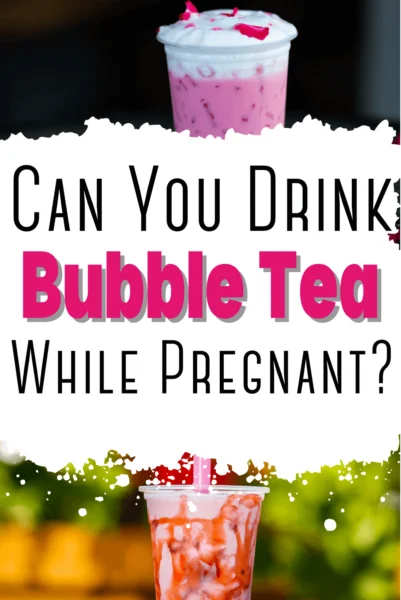Updated May 8, 2023
If you’re like us, you probably enjoy a good bubble tea every now and then.
But can you drink bubble tea while pregnant? The answer is yes – but there are some things you need to know before you order up your favorite boba tea!
In this post, we’ll share some tips on enjoying bubble tea while pregnant and the risks and benefits of drinking it.
Read on to know more!
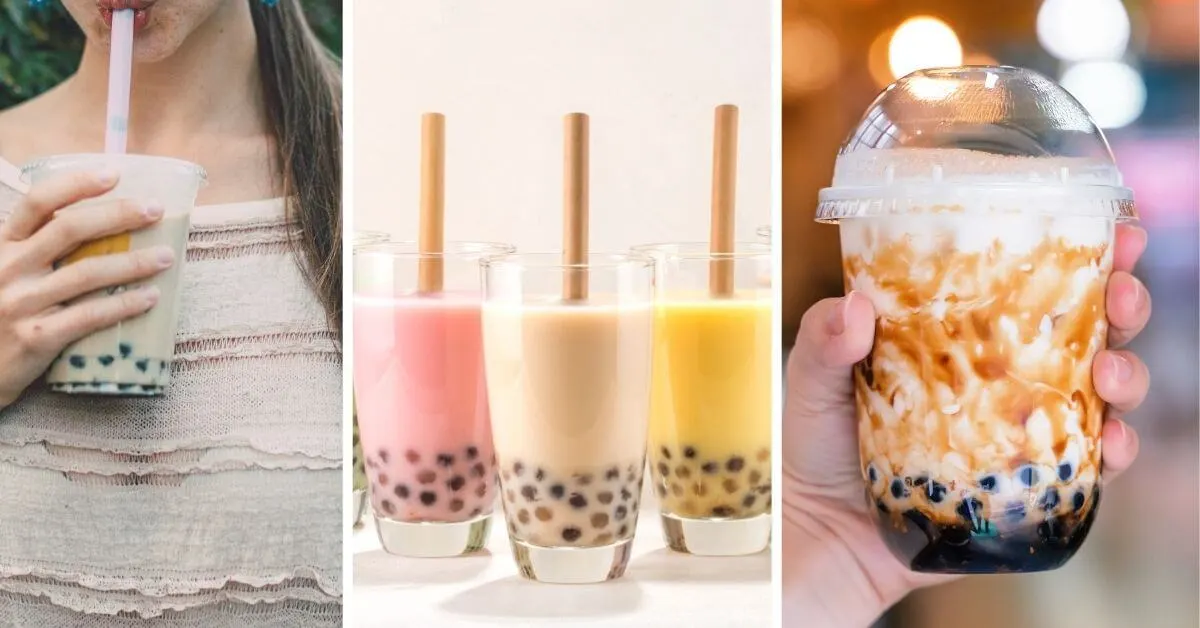
Can you drink bubble tea while pregnant?
Pregnant women are often told to limit their caffeine intake, but what about drinking bubble tea?
Bubble tea is a popular drink made with tea, milk, and tapioca pearls.
It can be found in many different flavors and can be made with or without caffeine.
So, can you drink bubble tea while pregnant?
According to our OB/GYN Dr. Doug Penta, MD, generally speaking, yes you can, if it is an occasional treat. However, there are a few things you’ll want to be cautious about. First, it is important to limit your caffeine intake to a max of 200mg a day. That’s about the equivalent of a cup of coffee.
While bubble tea generally contains less caffeine than a cup of coffee, it is still best to limit your intake to 200mg per day.
And if possible order your bubble tea with green tea or decaffeinated tea.
Green tea is naturally low in caffeine and is safe to drink during pregnancy.
Second, if you are pregnant, you should avoid bubble tea that is made with artificial sweeteners.
If you are going to include artificial sweeteners in your diet during pregnancy, it is important to choose an artificial sweetener that is safe to consume during pregnancy.
The safest options in artificial sweeteners are:
- Splenda: Splenda is a brand name for an artificial sweetener that is used in place of sugar. The active ingredient in Splenda is sucralose, which is a synthetic compound that is 600 times sweeter than sugar. While sucralose is derived from sugar, it is processed in such a way that the body does not recognize it as sugar. As a result, Splenda does not cause the blood sugar spikes that are associated with regular sugar. In addition, because Splenda is so much sweeter than sugar, less of it is needed to achieve the same level of sweetness. This makes Splenda a popular choice for people who are trying to reduce their sugar intake.
- Stevia: Stevia is a plant that is native to South America and has been used for centuries as a sweetener. The leaves of the stevia plant contain compounds that are hundreds of times sweeter than sugar, making it an excellent alternative for those looking to reduce their sugar intake. Stevia is also calorie-free and does not have any adverse effects on blood sugar levels, making it a safe choice for diabetics. In recent years, stevia has begun to gain popularity as a natural sweetener in the United States, and it is now available in many supermarkets and health food stores. Whether you are looking to cut down on your sugar intake or simply want to try something new, stevia is definitely worth checking out.
You also want to avoid too much natural sweetener in your bubble tea.
Some bubble teas are packed with sugar and other high-calorie add-ins that should be avoided during pregnancy.
You can customize your bubble tea and request it be made with less sugar.
Skip the sugary syrups and ice cream-filled drinks too!
Third, it is important to choose bubble tea that is made with fresh, quality ingredients.
Make sure the milk used is pasteurized and the tapioca pearls are cooked before being added to your drink.
You may find that drinking bubble tea during your first trimester
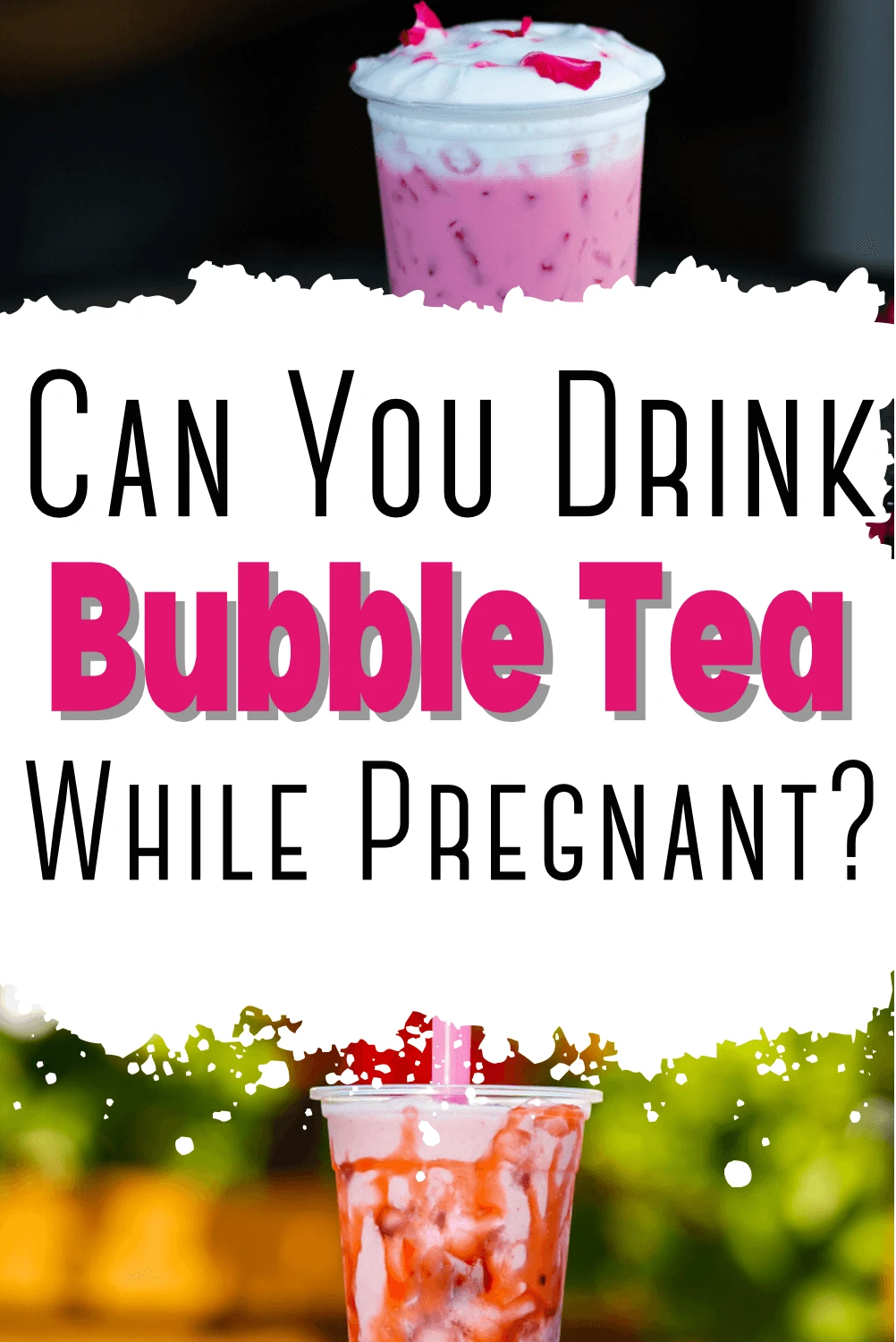
What is bubble tea and where did it come from?
Bubble tea, also known as Boba tea is a cold drink made with tea milk, sweetened tapioca pearls, and sometimes fruit or other flavors.
Bubble tea is a Taiwanese drink that has become very popular in many places in the world.
They are especially popular in the southeast and the southwest areas of the United States.
Not at all surprising given the summer heat in these regions.
Ice cold bubble tea is the perfect companion on a scorching hot afternoon.
What are the ingredients in bubble tea?
Bubble tea typically consists of tea, milk, and tapioca pearls, although there are many variations.
The tea can be black, green, or oolong, and it is often brewed with flavorings such as fruits or spices.
The milk can be whole milk, condensed milk, almond milk, or coconut milk.
The tapioca pearls are small balls made from tapioca starch that is cooked in sugar water until they become chewy.
Bubble tea is usually served cold, and it is often garnished with a slice of lemon or a sprig of mint.
Are there any risks associated with drinking bubble tea while pregnant?
Bubble tea is generally safe to consume during pregnancy, there are a few potential risks to be aware of.
First, wide varieties of bubble tea are made with large amounts of sugar.
Consuming too much sugar can lead to weight gain and other health problems during pregnancy.
Second, bubble teas may be made with herbal teas.
Herbal tea is best avoided during pregnancy.
You can drink green tea while pregnant and that is an excellent choice of tea for your boba drink.
Third, bubble teas can be made with and without caffeine.
It is best to limit the amount of caffeine you drink during pregnancy.
Fourth, The tapioca balls in bubble tea can sometimes be a choking hazard.
For this reason, it is vital to drink bubble tea slowly and chew the balls thoroughly before swallowing.
In addition, be sure to check the ingredients list for any bubble tea you purchase.
Some recipes include tapioca pearls that have been boiled in water, while others use unpasteurized milk.
If you’re pregnant, it’s best to avoid unpasteurized milk products and tapioca pearls that have not been boiled.
There is a slight risk of food-borne illness from consuming bubble tea.
You can reduce your risk by making sure your bubble tea is made with pasteurized milk products and that the tapioca pearls have been boiled and cooked completely.
Overall, bubble tea is a safe treat to enjoy during pregnancy as long as it is consumed in moderation.
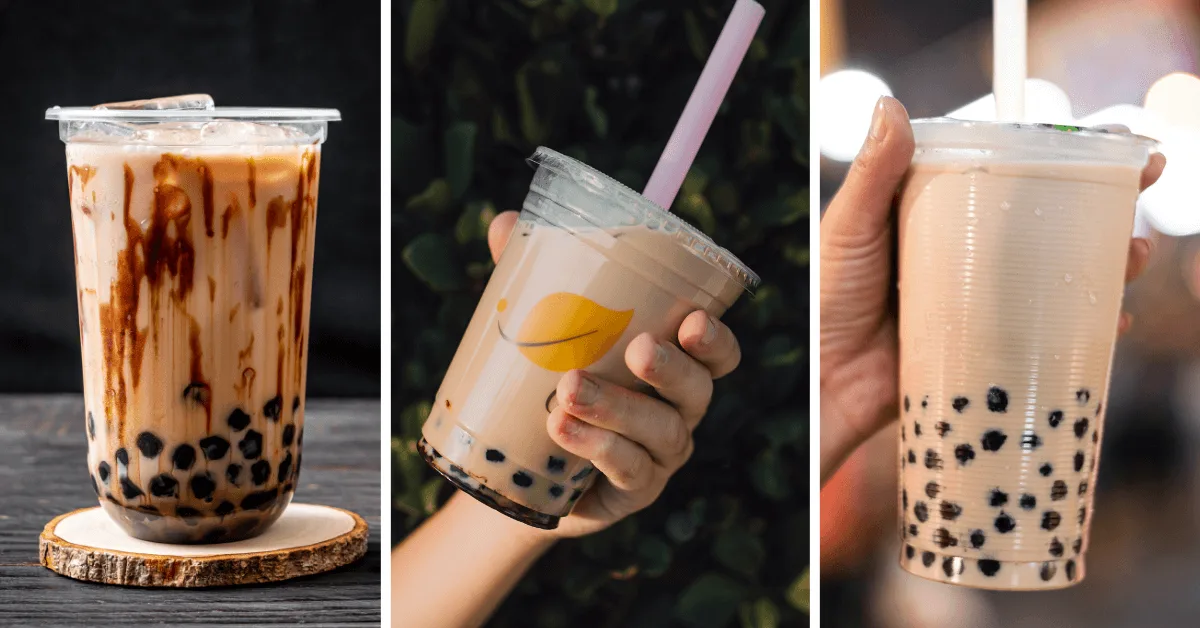
How much bubble tea can you safely drink per day while pregnant?
While the amount of caffeine in bubble tea can vary depending on the recipe, it’s generally safe to consume up to 200mg of caffeine per day while pregnant.
That means you should limit yourself to one or two cups of bubble tea per day.
We believe bubble teas should be consumed in moderation and should be considered an occasional treat during pregnancy.
There isn’t a lot of health benefit to drinking your calories in pregnancy and bubble teas can be very high in calories.
You would and your baby would be much better off drinking regular tea and enjoying a healthy meal with those calories.
So while 1-2 cups of bubble tea a day may be safe, it isn’t healthy during pregnancy.
What are some good brands to look for if you want to give it a try yourself?
When it comes to bubble tea, there are a few key things to look for in a good brand.
First, the tea should be high quality and be brewed fresh.
Second, the bubbles should be large and airy, not small and dense.
Third, the tapioca pearls should be chewy but not too hard.
Fourth, the sweetness level should be adjustable. And finally, the price should be reasonable.
With those criteria in mind, some of the best brands of bubble tea include Gong Cha, Happy Lemon, Koi Café, and Tiger Sugar.
These brands all use fresh ingredients and offer a variety of flavors, and you can customize your drink to fit your desire for less caffeine and less sugar during pregnancy.
Is it safe to drink pearl milk tea during pregnancy?
Yes, pearl milk tea, also known as bubble eat or boba tea is safe to drink during pregnancy.
So if you have been wondering: Is milk tea safe during pregnancy? It is as long as you follow some simple precautions.
You want to make sure that your milk tea (bubble tea) is made with:
- Fresh ingredients
- Green or Black tea
- Pasteurized milk
- Ask for less Sweetener
- Cooked tapioca pearls
- Choose a lower or no caffeine option
- Chew the tapioca balls fully to avoid choking
- Limit your consumption of bubble tea to the occasional drink while pregnant.
Is Taro boba safe during pregnancy?
Taro is a tropical root vegetable that is frequently used in Asian cuisine.
It has a starchy texture and a slightly sweet flavor, and it is often boiled or steamed.
While taro is generally considered to be safe for pregnant women to eat, there are a few potential risks to be aware of.
First, taro can contain high levels of oxalate, which can lead to kidney stones.
Generally, the cooking process denatures the oxalates in taro, but it is something to be aware of.
The taro that is used to make the beautifully purple-hued bubble tea is usually in a powdered form and contains sugar and creamer.
Keep this is mind when ordering your bubble tea so you can accurately keep track of how much sugar and how many calories you are consuming.
Some boba shops may use fresh taro.
It is important to not eat taro raw and it should never be consumed raw during pregnancy.
You want to be sure that the taro is properly cooked.
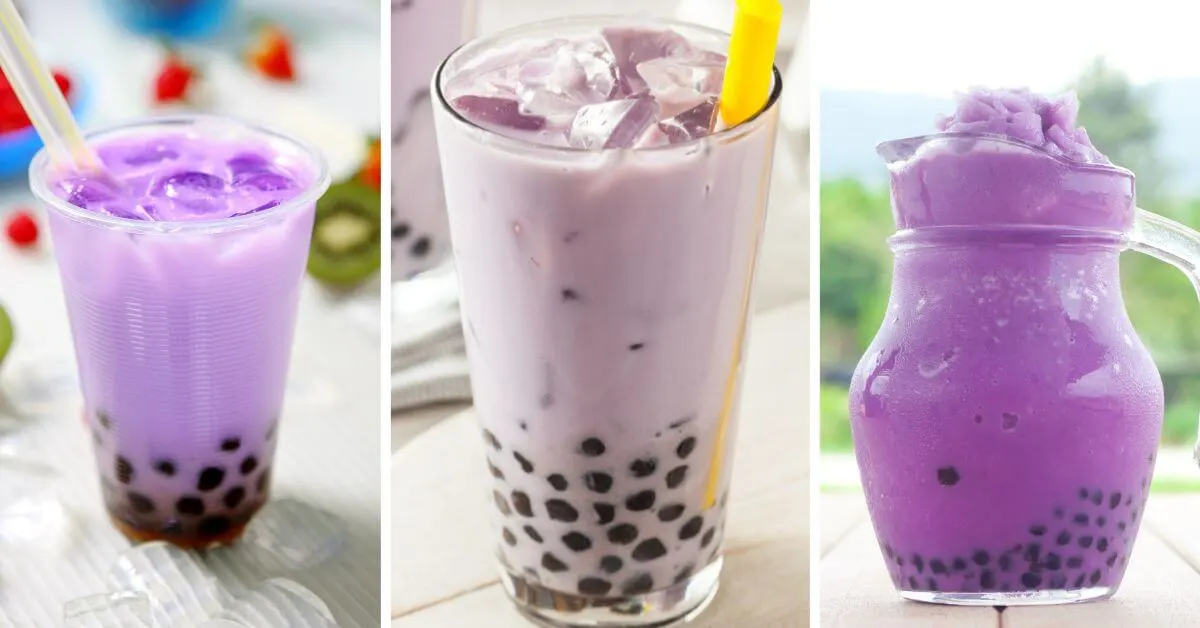
Does bubble tea have caffeine?
Bubble tea usually contains caffeine, but most bob tea shops will let you customize your drink, so you can choose a te with lower caffeine or order your drink decaf tea.
You should limit yourself to no more than 200mg of caffeine per day.
In fact, we would offer you should probably consume even less.
Drinking caffeinated beverages increases dehydration, which will increase your feelings of fatigue, and morning sickness, and could lead to contractions if you become severely dehydrated
Preventing dehydration during pregnancy is very important to avoid serious complications for you and your growing baby.
You want to make sure you are drinking enough fluids to avoid dehydration.
Drinking bubble tea can help you stay hydrated if you choose decaf tea and provide you with healthy antioxidants.
What are the Signs and Symptoms of Dehydration During Pregnancy
Aside from uterine contractions, the following are some other signs and symptoms of dehydration during pregnancy:
- Feeling thirsty (though dehydration can occur during pregnancy without feeling thirsty.
- Headaches especially when standing.
- Constipation
- Sleepiness
- Dry mouth with chapped lips
- Poor skin elasticity. When you pinch your skin it is slow to return to normal.
- A decrease in visits to the bathroom
- Dark-colored urine (concentrated urine)
- Feeling dizzy or light-headed when quickly getting out of bed or standing up.
List of foods to not eat when pregnant:
- Foods that are not pasteurized– certain types of cheese like soft cheeses, Brie, Blue Cheese, etc.
- Certain types of fish– shark, swordfish, anything high in mercury
- Raw eggs including egg nog, hollandaise sauce, homemade mayonnaise, homemade eggnog, and runny eggs.
- Undercooked meats– lunch meats. Deli meats.
- Hot foods that are not “hot”, avoid hot foods that have been sitting out without a warming source. Same for foods that should be eaten cold. If no ice or refrigeration source is keeping the food cold, take a pass.
- Caffeine– soda, chocolate, and energy drinks. (Limit your caffeine to less than 200 mg a day)
- Herbal Teas (There are so many ingredients in herbal teas so it is best to avoid them simply. Green tea is OK.)
List of Foods you should eat during pregnancy:
- Avocado
- Oatmeal
- Pinto Beans
- Black beans
- Arugula
- Bananas
- Dark Green Leafy Vegetables
- Brussel sprouts
- Carrots
- Green Beans
- Eggs
- Lean Meats
- Apples
- Oranges
- Salmon
- Shrimp
What should a pregnant woman eat daily?
A pregnant woman needs to consume various nutrients every day to support her health and the development of her baby.
Protein is essential for building new tissue and can be found in meat, poultry, fish, legumes, and eggs.
Calcium is necessary for strong bones and teeth and is especially important during the third trimester when the baby’s skeleton is rapidly developing.
Pregnant women should aim to get 1000 mg of calcium per day from low-fat dairy products such as milk, yogurt, and cheese.
Iron is also important for the formation of new blood cells, and pregnant women need about 27 mg of iron per day.
Final Thoughts
So, can you drink bubble tea while pregnant?
The answer is yes – as long as it’s made with fresh and safe ingredients.
However, it’s always a good idea to check with your doctor before consuming any new food or drink while pregnant.
If you do decide to drink bubble tea try to stick with low sugar and decaffeinated options.

